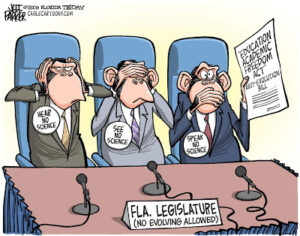[UFF Preface: The American Association of University Professors allies with your union and our national affiliates, NEA and AFT, on virtually all issues. The whole country is watching as the Florida Legislature attempts to undermine academic freedom. As the article indicates, UFF strongly opposes House Bill 839, and the union has collected petition signatures at universities and colleges all over Florida. Our UFF-FAU chapter collected signatures on this and other issues on “Red for Ed” Wednesday, April 17. You can still write your state Representative on this and other issues before the legislative session closes.]
from Academe Blog
HANK REICHMAN
Last year the AAUP’s Committee on Government Relations released a report, “Campus Free-Speech Legislation: History, Progress, and Problems,” which concluded that campus free-speech laws and academic freedom are “false friends.” Nevertheless, such legislation continues to advance in several states. Especially troubling is a proposal that has moved out of committee in the Florida House of Representatives that would require the state’s universities, and if an amendment passes its community colleges, to conduct annual “viewpoint diversity” surveys. Specifically, House Bill 839 states: “Each institution shall conduct an annual survey of students, faculty, and administrators that assesses the extent to which competing ideas, perspectives, and claims of truth are presented and members of the university community feel safe and supported in exploring and articulating their beliefs and viewpoints on campus and in the classroom.”
The proposal poses a direct and serious threat to academic freedom in the state. The senate of the United Faculty of Florida, the union representing faculty in the state’s universities, voted unanimously in February to oppose the survey.
“I shouldn’t be forced to tell the state of Florida how I feel about certain political matters,” said Florida State University professor and UFF member Matthew Lata. He raised concerns about whether survey results would prompt the firing of liberals or conservatives in an attempt to have balanced viewpoints on campus. “Let’s say in political science you have 20 people and the survey determines 15 are liberal and five are conservative. Are you going to fire the liberals and hire more conservatives? What would happen?” Lata asked.
“I am worried that the survey itself is a predetermined assumption that our state university system is a collection of liberal institutions that are graduating young people with progressive ideals who go out into the world to promote these ideals,” added Democratic Representative Carlos Guillermo Smith.
HB 839 was on the floor for second reading this week but was temporarily postponed. On Monday the state’s Republican governor, Ron DeSantis, held a press conference in which he announced “Freedom of Expression” statements released by the state university system and the state colleges. It was unclear what effect these might have on the proposed legislation.
While Florida faculty continue to lobby and organize to defeat this inappropriate intrusion into the political views of faculty, staff, and students, they have also worked to defeat HB 7115, which would remove executive searches for college presidents and provosts from the Open Records law. UFF President Karen Morian and AFL-CIO Legislative Director Rich Templin spoke passionately against this measure, but the House Education Committee approved the bill nonetheless. However, there is no Senate companion bill and passage to add an exemption requires a two-thirds vote of both houses of the Legislature.

